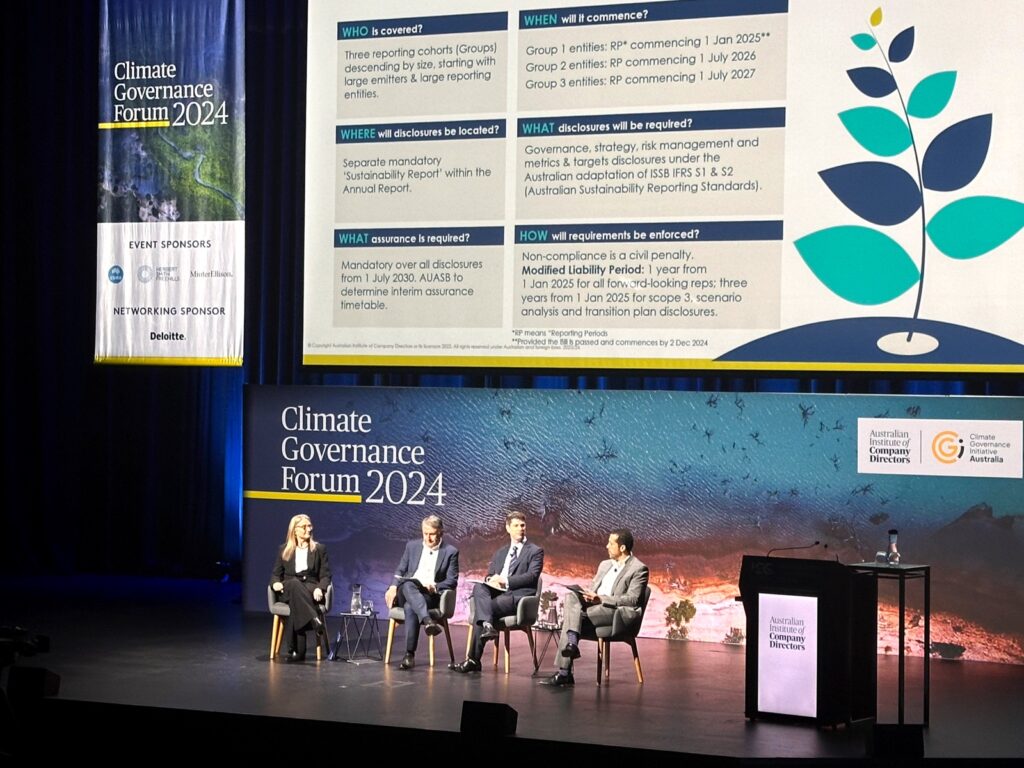LEARN
Insights from the AICD 2024 Climate Governance Forum
The AICD 2024 Climate Governance Forum highlighted actions businesses need to take to address environmental management and climate reporting.

The Australian Institute of Company Directors (AICD) 2024 Climate Governance Forum, held on Friday, 23rd August at Sydney’s International Convention Centre (ICC), proved to be an incredibly timely and impactful event. Coming just one day after the Australian Senate passed a pivotal bill mandating climate risk disclosure rules, the forum served as an informative platform for discussing the future of corporate governance in Australia.
Mandatory climate reporting: A new era begins
The bill, passed on Thursday, 22nd August, marks a significant shift in corporate responsibilities, with mandatory climate reporting scheduled to come into force from 1 January 2025.
This new legislation applies to organisations across the spectrum – publicly listed companies, private enterprises, and not-for-profit organisations alike. The implementation will be progressive, with varying requirements based on the size and nature of the business, as outlined in a forthcoming table of phased implementation.
Under this new regime, the scope of disclosures will be encapsulated within a separate mandatory ‘Sustainability Report’ that forms part of the Annual Report. This report will address key areas such as governance, strategy, risk management, and metrics and targets, all aligned with the Australian adaptation of the S1 and S2 Australian Sustainability Reporting Standards (ASRS).
Key disclosure requirements
The disclosure requirements are comprehensive, covering both current and future actions and their effects:
Current action and effects:
- Governance of climate risks and opportunities
- Scope 1, 2, and 3 emissions
- The amount and percentage of assets or business activities vulnerable to climate risks and aligned with climate opportunities
- Capital deployment towards climate risks and opportunities
- Internal carbon pricing
- Remuneration linked to climate performance
Future actions and effects:
- Identification of climate risks and opportunities
- Anticipated changes to business models and resource allocation
- Projected changes to financial position and performance in the short, medium, and long term
- Scenario analysis and climate resilience planning
- Transition plans and climate targets
The shift from voluntary to mandatory: Lessons from industry leaders
A key takeaway from the forum was from Mr Andrew Stevens, Non-executive Director of Stockland Group Limited, regarding the notion that the urgency for company leadership to move quickly from a mindset of ‘may do’ to ‘should do,’ before it becomes a ‘must do.’
The experiences shared by Mr Stevens, reflecting on Stockland’s seven-year journey of voluntary reporting, underscored the challenges involved. He highlighted the importance of embedding sustainability into the core of business strategy and operational reporting, a process that was neither swift nor easy. With the inclusion of Scope 3 emissions reporting, the task becomes even more formidable.
For companies required to lodge their Sustainability Report with the Australian Securities and Investments Commission (ASIC), it’s crucial to understand that this is not merely a financial report for the current period. It also includes future targets and narratives. Without reliable and robust data to base these reports on, directors may find themselves precariously balancing between ‘greenwashing’ and disclosing information that could influence key stakeholders’ decisions about future actions.
The risks of delay: A call to action
Many company leaders might believe that climate disclosures are not an immediate priority and that they can afford to wait a year or so before initiating the necessary work. However, this approach overlooks the complexities of establishing effective working groups, implementing robust systems, and creating governance structures.
Delaying action could dramatically increase risk exposure for both companies and directors. At best, this would be a compliance-driven approach, likely missing significant opportunities to create a competitive advantage during a major market transition. In a landscape where there will be leaders, fast followers, and those at risk of being left behind, the urgency to act cannot be overstated.
How C6 ESG can help: Introducing Carbon Map
At C6 ESG, we are committed to understanding the challenges ahead and to helping the industry navigate to the new reporting norma.
To assist the journey, we developed Carbon Map – a comprehensive tool designed to help organisations quickly assess their current level of readiness.
Through a staged four-week engagement process, Carbon Map enables companies to align their executive teams’ understanding of the new requirements and evaluate the adequacy of their future plans and ambitions to meet the minimum mandatory compliance standards.
The balanced Carbon Map report offers both an executive summary and detailed recommendations across the key reporting requirements: governance, strategy, risk, metrics, targets, and operational systems. This in-depth analysis provides organisations with valuable insights to inform future strategies and priorities in a market that is steadily transitioning towards net zero.
Book a half-hour discovery session now to find out how we can help your business thrive in a net zero world.
Ready to change sustainably?
Book a half-hour discovery session now to find out how we can help your business thrive in a net zero world.
Contact




